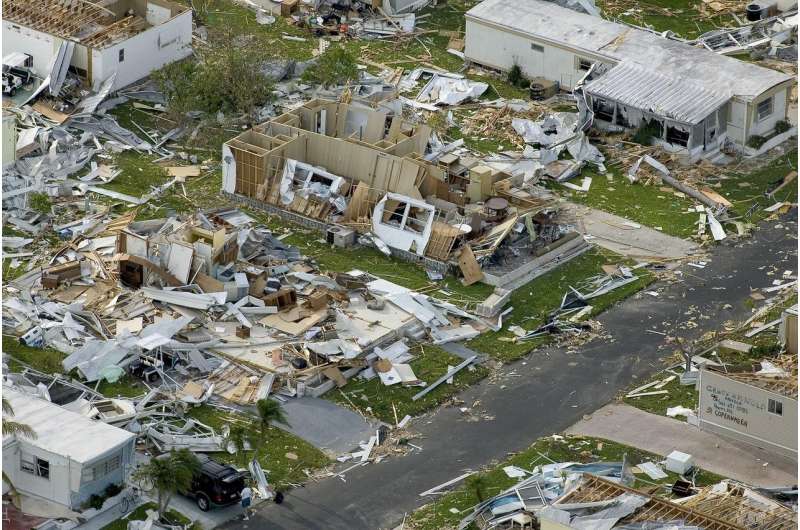Study of health woes in Puerto Rico after Hurricane Maria shows effects of climate change

A new study that found long-term health problems in Hurricane Maria survivors underscores the devastating health consequences of climate change on communities of color, experts say.
In the aftermath of the September 2017 storm, Puerto Ricans suffered higher rates of obesity, arthritis, high cholesterol, blood pressure and triglycerides, according to a study in the Journal of the American Medical Association.
The analysis, which compared data from more than 800 participants two years before and after Maria, also found that more than twice as many participants reported eye disease, fatty liver disease and osteoporosis following the hurricane.
Adults in Puerto Rico had high rates of several chronic conditions before Maria, the authors noted, and the storm only worsened the island's already strained health care system. The findings illustrate the long-term health effects climate crises have on historically under-resourced communities of color.
"Then you have the acute events of Maria, and it's harder to get the kinds of services not just in major cities like San Juan, but in more remote places on the island," said Anita Chandra, vice president and director of RAND Social and Economic Well Being and the corporation's Center to Advance Racial Equity Policy. "Climate affects, and disaster affects whole communities," she added, and they "feel it holistically, not just at the individual level."
Chandra led the development of a RAND health- and social-services-focused disaster recovery plan for Puerto Rico and specializes in public health emergency preparedness and long-term disaster recovery. She noted the prevalent conditions the researchers found demonstrate significant disparities.
"Cholesterol, heart issues, blood pressure, mental health are diseases of both stress and access," she said.
Previously strained community supports and systems aren't equipped to handle an acute climate disaster, exacerbating health problems and chronic stressors in its aftermath.
"Communities that are historically vulnerable or have less access to certain kinds of economic and social resources often bear the disproportionate brunt," Chandra said. "We worry about this kind of overlapping sequence of short- and long-term climate-induced disaster because it has a compounding effect that makes it harder and harder to recover in the long term."
Stress experienced after a disaster can worsen people's health conditions, said Jonathan Sury, a project director at Columbia University's National Center for Disaster Preparedness. And communities of color already suffer from a disproportionate number of health problems because of historic trauma and chronic underinvestment.
"With major disasters that are exacerbated through climate change, any preexisting health conditions can be worsening through a number of ways: through stress, household stress, family stress, individual stress," he said. "That gets translated into biological changes."
Sury noted another threat comes from environmental contamination that can creep in after a storm. Household mold can aggravate chronic obstructive pulmonary disorder in adults and asthma in children. Industrial runoff, nearby hazardous waste sites, groundwater contamination and airborne contaminants can create additional hazards, especially in poorer areas where residents may be unable to relocate quickly.
As with the pandemic, climate disasters like Maria magnify lack of access to quality health care, said Carmen Velez Vega, a public health professor at the University of Puerto Rico and principal investigator of several ongoing studies on environmental health disparities on the island.
Vega traveled across the island for focus group analyses and followed survivors, finding older adults who no longer had caregivers, people who lost their medications, or whose insurance companies wouldn't pay for supplies longer than 30 days.
"The hurricane created dislocation," she said. "It created this disconnect of people with their services—but on top of that, it also revealed the great amount of people that didn't have any care, that were suffering conditions that got worse after the hurricane because of such a long time it took to establish services again."
Vega noted that some low-income community health clinics were able to open new locations and improve their infrastructures. But overall, a shortage in health care professionals stymied care after the storm, with many doctors and nurses leaving the island to find jobs, she said.
Vega and others emphasized the need to more often include long-term health recovery in government disaster preparedness plans and invest in more effective community-level resources. The Puerto Rico Public Health Trust has planned to hire more community health workers to help residents navigate the system and connect them with services, which Vega said will be key especially for those in remote areas of the island.
"They're too sick to go out to the clinics, don't have transportation, don't have the people to care for them," she said.
Experts emphasize that chronic climate changes will continue to threaten human health.
"We still have people living in very fragile areas where we don't even have to wait for a hurricane to come. There's a big storm, (and) these people get flooded out of their homes," Vega said. "We have people that get sick and will get sicker because their homes are not adequate.
"This is not in the future. This is in the present."
More information: Josiemer Mattei et al, Chronic Diseases and Associated Risk Factors Among Adults in Puerto Rico After Hurricane Maria, JAMA Network Open (2022). DOI: 10.1001/jamanetworkopen.2021.39986
©2022 USA Today
Distributed by Tribune Content Agency, LLC.



















